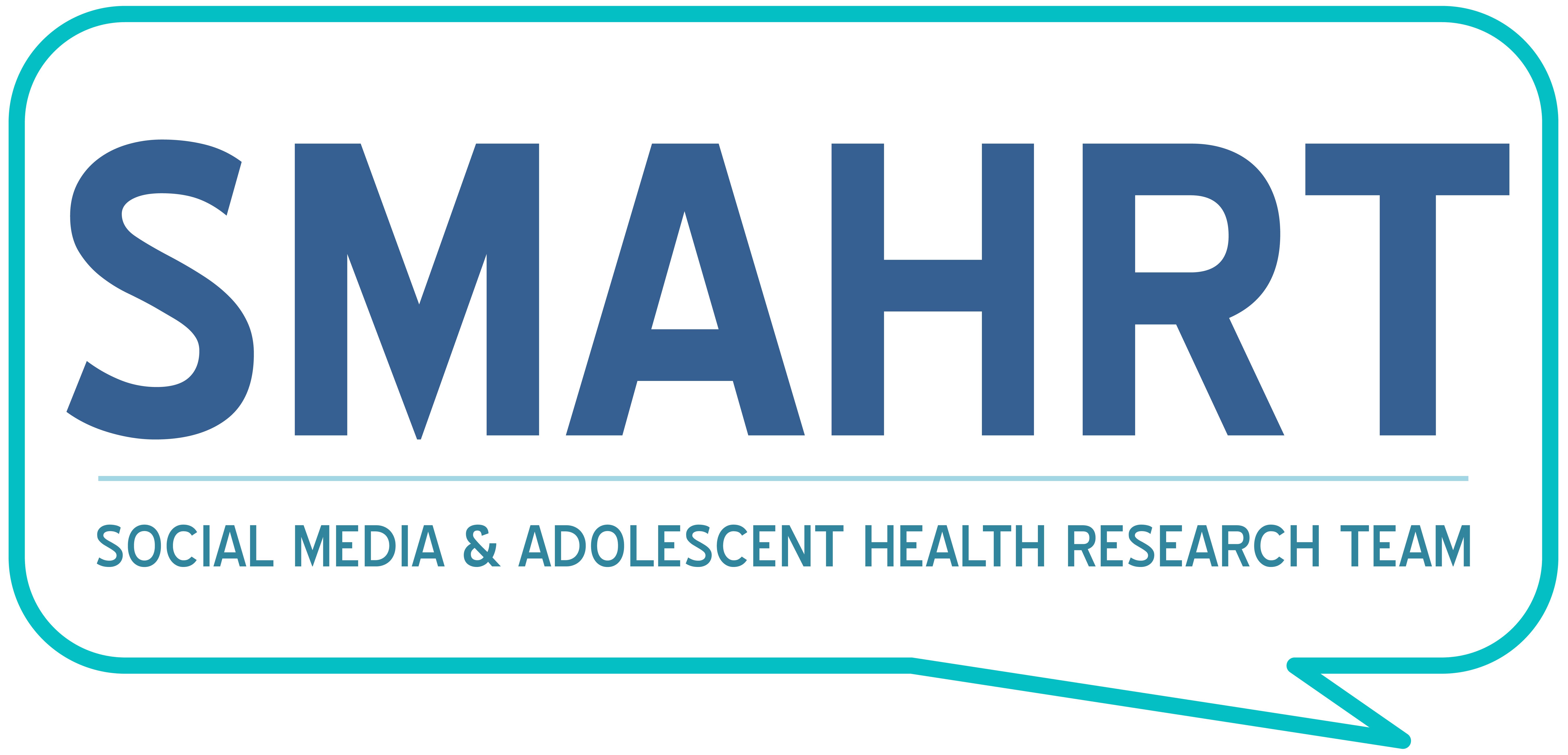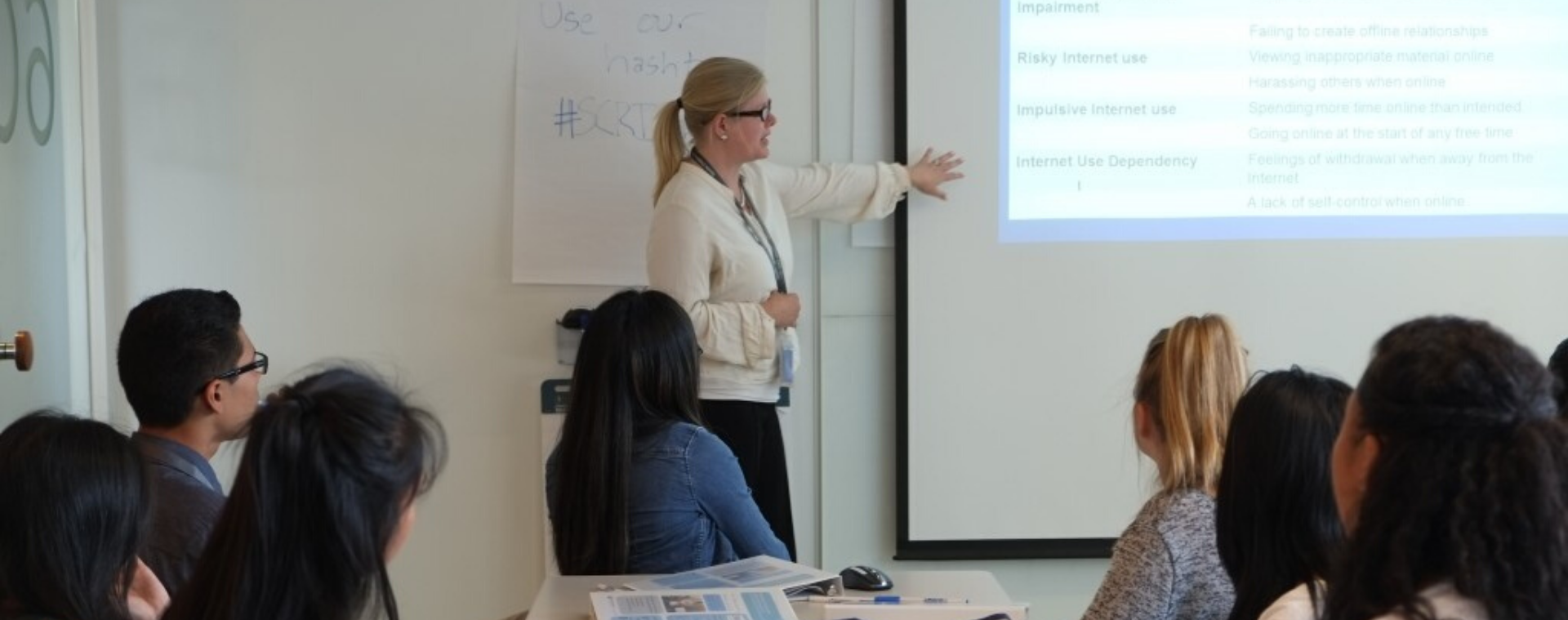Exploring the intersection of social services, technology use, and policy
By Aleenah Ansari / Communications Intern
Although the research of the Social Media and Adolescent Health Research Team (SMAHRT) often informs current understanding of how social media changes, and the ways it can be used more judiciously, these findings extend beyond the realm of guidelines for technology use among young adults. Jesse Rohwer, a SMAHRT research intern who has been with the team since Oct. 2016, is interested in the use of social media in social service industries such as healthcare, social work, and vocational and substance abuse clinics.
Jesse is currently a senior in the Applied Behavioral Science Program at Seattle Central College (SCC), which strives to prepare students to enter human services professions through coursework exploring information-seeking strategies and research, ethics, and specific job skills necessary for future field work. In particular, Jesse is interested in the ethical oversight provided by code of ethics for the National Association of Social Workers (NASW), which he had previously researched in courses about quantitative principles and ethics.
“I wrote a paper on it and slowly became more interested in it, especially with social media being an untapped area of research. I’ve continued to make [social media research with a psychological component] my speciality because I think it’s really interesting,” Jesse said. “There is really nothing else like [social media] that affects our lives in that way, and [has] changed lives so dramatically.”
The NASW Code of Ethics was created in 1960 to serve as a guide to best practices and core values for social work professionals. This code highlights that professionals in social services are committed to enhancing the well-being of the people they serve, and they strive to empower marginalized individuals such as those in poverty. The code states that social service professionals should strive to protect client confidentiality and be cautious when sharing information over the phone or through electronic and computer technology; however, the most recent revisions have only modified the non-discrimination standards section, and no revisions have occurred to reflect the rise of social media and technology use. Resultantly, the code lacks specific ethical protocol for client and patient interaction on social media because these platforms didn’t exist when the code was created.
Through his current independent research project at SMAHRT, Jesse is currently exploring the ethical practices of social service providers in regards to their use of social media to interact with clients. As a research intern, he has been working 15 hours a week to develop a codebook, arrange interviews with social service professionals, and analyze the data. This project fulfills the field practicum component of Jesse’s Applied Behavioral Science Program, and he will be presenting the findings at the Undergraduate Research Symposium (URS) at the University of Washington on May 19.

“I’ve done a lot of research on this particular topic, and it seems like there’s a blatant hole in the research … that I would like to fill,” Jesse said. “I’m hoping [my research project] brings up more questions than answers.”
Jesse’s project explores the potential gap in research about the lack of training of social work providers regarding social media use, and a lack of industry-wide protocol about this topic. To seek information about this, Jesse conducted interviews with social service professionals from a range of public and private organizations, and he asked about their level of interaction with current or former clients on social media, as well as their perspective on how well the NASW Code of Ethics adequately outlines the best practices surrounding social media use. So far, the interviewees have provided a range of responses about their awareness of the protocol surrounding social media use, even from professionals working in the same organization.
“The [code] has very vague statements on new technology like ‘follow the advice of authority figures’ and ‘be careful when using technology’” Jesse said. “Some industrious agencies are very clear about the boundaries between a professional and the client.”
Jesse is still in the process of conducting interviewees, and he is excited to share the findings and takeaways at URS next month.
“I have lots of colleagues in my program that work at [social service] organizations, and I would like to engage them and interest them in this research,” Jesse said.
Jesse’s project also brings up questions how to improve policies about client-professional relationships social media relationships, and if these policies should be implemented in school, an agency-by-agency basis, or on an industry-wide level.
“I would like to inform the industry to hopefully change the policy,” Jesse said.
Jesse initially joined SMAHRT to gain relevant research experience in the social sciences, and have the opportunity to network with professionals at Seattle Children’s. Long-term, he hopes to pursue a Master’s in Public Administration. He noted that working as a research intern helped him explore the intersection of technology, social science, and policy, and how ethical considerations can inform policy decisions. He hopes to apply the scientific principles he has learned to his future work in policy reform.
“Other than being interested in the ethical sides of social media, the most interesting parts of my program have dealt with public policy and political economy,” Jesse said. “I’ve gotten the impression that that’s where the work gets done and things really change, and I would like to get involved with it and possibly make a career.”
Throughout his time on the team, Jesse said he felt very supportive by the other interns and staff members who have provided contacts for interviews, insight about creating a codebook for his research project, and feedback on survey questions or written content for his presentation. He has also appreciated the support of Dr. Moreno in the process of designing his independent project and optimizing his survey.

“She’s been really helpful on the project but most importantly, she’s just incredibly supportive,” Jesse said. “She does so much, and I don’t know quite how.”
With the support of the team, Jesse hopes that this research project provides sufficient findings that can translate into a published paper in the future. Projecting forward, Jesse will be graduating from his Behavioral Science program at the end of this quarter. Afterward, he will be living in Tacoma during his gap year and hopes to pursue graduate school after.
To learn more about Jesse’s project and the final findings, be sure to visit the Undergraduate Research Symposium on May 19 in Mary Gates Hall. You can read our previous Intern Spotlight on Aubrey Gower here, or our previous Scholar Spotlight on Ema Bargeron here.
Follow our Instagram @SMAHRTeam as we post the SMAHRT interns in the final stretch in preparing for the 2017 UW URS

